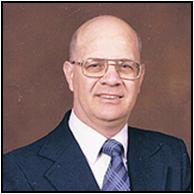 |
|
| Volume 20 Number 5 May 2018 | Page 12 |
Russ Vickers
 Tom Olson told his story about how he learned to love the Lord. He stated:
Tom Olson told his story about how he learned to love the Lord. He stated:
One morning as I was going to work, I was thinking of the words, “Simon, son of Jonas, love thou me?” and wished with all my heart that I could answer them as Peter did. I felt sad that I could not. Then this thought came to me. “Well, if I cannot say so much as Peter, perhaps I could turn it around a little and find something easier.” So, I began to think that there was one thing I could not say. I could not say, “Lord, Thou knowest that I do not love Thee.” I found some comfort in that. At last, I grew bold enough to look up and say, “Lord, Thou knowest that I want to love Thee.” Then, I began to think of His great love for me. I thought of His life, of His words and of His cross. Almost before I knew what I was doing, I looked up and said, “Thou knowest that I do love Thee!” At that moment, my heart became lighter and my life had more meaning.
In John 21:15-17, Jesus asked three times the question “Lovest thou Me?” to Peter. Peter must have wondered why Jesus would ask Him this several times. It is possible that Jesus asked three times to parallel the denial of Peter three times. Peter answered the first two times with patience, “Yea, Lord: thou knowest that I love thee.”
The third time, Jesus asked a variation of the question in verse 17 using a milder form of the word love (phileo, meaning brotherly love). Agape is a love that is so strong it gives up everything in order to promote the wellbeing of him who is loved, which is the word for love that our Lord used the first two times. Apparently, Peter was reluctant to claim the degree of love of which Jesus asked, perhaps in view of Peter's denial of Christ. Jesus desired Peter to fully commit to Him, and He challenges us to do the same.
Do we think we love Jesus? Or, do we know it? We must be much stronger than ever before, loving Jesus more than anything else and anybody else in this world so that we can say with bold confidence, “Yes, Lord. You know I love You!”![]()
Donald R. Fox
 Before television, there was the radio. Radio became common in the United States in the 1920’s with the first commercial broadcasts. Almost anyone could afford a radio. Since I was born in 1932, the radio was our source of family entertainment. As I studied how rumors, slanders and boldface lying are so common for us mortals, I thought about the old rumor concerning “Uncle Don’s Radio” program. The rumor and slander became an urban legion. Howard Rice, born in 1897, a former vaudeville performer, portrayed Uncle Don. The rumor was that Howard Rice said some ugly things at the close of one of his broadcasts, not knowing that the mike was still on. Over the years, this was proven wrong. However, the radio program ceased because of this rumor and slander.
Before television, there was the radio. Radio became common in the United States in the 1920’s with the first commercial broadcasts. Almost anyone could afford a radio. Since I was born in 1932, the radio was our source of family entertainment. As I studied how rumors, slanders and boldface lying are so common for us mortals, I thought about the old rumor concerning “Uncle Don’s Radio” program. The rumor and slander became an urban legion. Howard Rice, born in 1897, a former vaudeville performer, portrayed Uncle Don. The rumor was that Howard Rice said some ugly things at the close of one of his broadcasts, not knowing that the mike was still on. Over the years, this was proven wrong. However, the radio program ceased because of this rumor and slander.
Christians must not be guilty of slander. “Blessed are they that wash their robes, that they may have the right to come to the tree of life, and may enter in by the gates into the city. Without are the dogs, and the sorcerers, and the fornicators, and the murderers, and the idolaters, and every one that loveth and maketh a lie” (Revelation 22:14-15 ASV). “For lack of wood the fire goeth out; And where there is no whisperer, contention ceaseth” (Proverbs 26:20). “The words of a whisperer are as dainty morsels, And they go down into the innermost parts” (Proverbs 26:22). “Truth is generally the best vindication against slander” (Abraham Lincoln 1809-1865). “Rumor travels faster, but it doesn’t stay put as long as truth” (Will Rogers 1879-1935).![]()